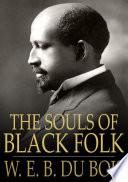Quotes from book
The Souls of Black Folk

The Souls of Black Folk is a 1903 work of American literature by W. E. B. Du Bois. It is a seminal work in the history of sociology and a cornerstone of African-American literature.

Source: The Souls of Black Folk (1903), Ch. I: Of Our Spiritual Strivings
Context: After the Egyptian and Indian, the Greek and Roman, the Teuton and Mongolian, the Negro is a sort of seventh son, born with a veil, and gifted with second-sight in this American world, — a world which yields him no true self-consciousness, but only lets him see himself through the revelation of the other world. It is a peculiar sensation, this double-consciousness, this sense of always looking at one's self through the eyes of others, of measuring one's soul by the tape of a world that looks on in amused contempt and pity. One ever feels his twoness, — an American, a Negro; two warring souls, two thoughts, two unreconciled strivings; two warring ideals in one dark body, whose dogged strength alone keeps it from being torn asunder.The history of the American Negro is the history of this strife, — this longing to attain self-conscious manhood, to merge his double self into a better and truer self.

“To the real question, How does it feel to be a problem? I answer seldom a word.”
Source: The Souls of Black Folk

“The problem of the twentieth century is the problem of the color line.”
Source: To the Nations of the World, address to Pan-African conference, London (1900). These words are also found in The Souls of Black Folk (1903), ch. II: Of the Dawn of Freedom